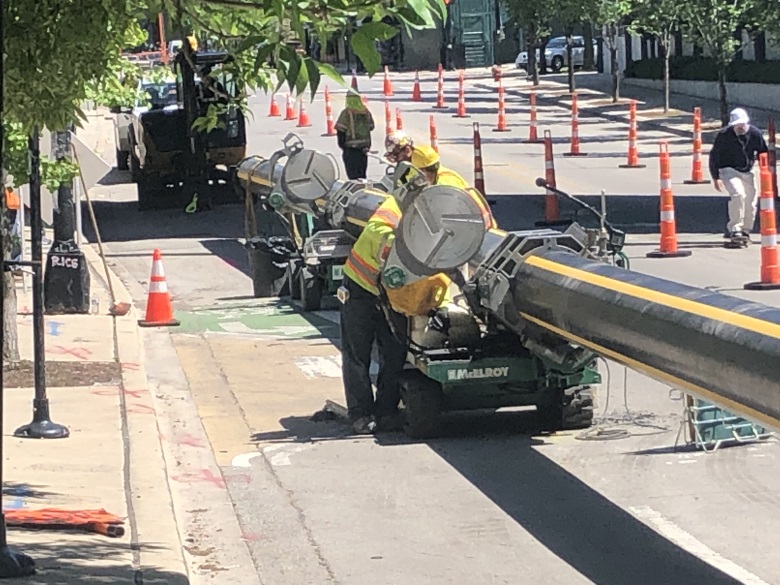Michigan High Court Invalidates Former State Officials' Flint Indictments | Columbus Ohio Dump Trucks

Cities scrambled to replace lead service lines after the Flint water crisis in 2014. Photo by Jeff Yoders/ENR
The Michigan Supreme Court ruled June 28 that a single Genesee County judge acting as a grand jury had no power to indict former Gov.
Appointing a judge to investigate as a somewhat oxymoronic "single grand juror" is a relic of Michigan law that goes back more than 100 years to when police departments, sheriffs and other law enforcement agencies lacked investigatory powers and could not subpoena witnesses or interview suspects. It's been used sparingly in most of the state except for three counties, usually in drug trafficking cases over the last three decades.
The 6-0 ruling said that such judges appointed as investigators cannot make indictments like the ones against Snyder, his former state health and human services director, Nick Lyon, and seven other Flint and state officials.
The Michigan laws in question "authorize a judge to investigate, subpoena witnesses, and issue arrest warrants. But they do not authorize the judge to issue indictments,” the majority said in the opinion. “And if a criminal process begins with a one-man grand jury, the accused is entitled to a preliminary examination before being brought to trial."
In a rebuke to Attorney General Dana Nessel (D), Chief Justice Bridget McCormack referred to the attorney general office's use of a single grand juror in the case as a "Star Chamber comeback," a reference to a secretive procedure used in 17th Century England, in the majority opinion.
The Flint water crisis exposed between 6,000 and 12,000 children to drinking water with high levels of lead in 2014 when the city managers appointed by Snyder switched Flint's water from being sourced from the Detroit Water and Sewerage Dept. to the Flint River. The city switched back in October 2015 after the high levels of lead were exposed by investigators including Virginia Tech engineering professor Marc Edwards.
In 2021, Nessel's office charged the nine state employees after appointing Genesee County Circuit Court Judge David Newblatt as the lone juror.
To date, only one local official has pleaded guilty to misdemeanor charges resulting from the water crisis.
Prosecution Was Reassigned
Nessel, who is running for re-election this November, vowed to change that and scrapped the investigation started by her predecessor, Bill Schuette (R), when she took office in 2019. She assigned prosecution of the case to Michigan Solicitor General Fadwa Hammoud who chose to pursue the case using the single grand juror method. A judge has approved a $600-million settlement for Flint’s victims with the state of Michigan.
In a statement released by Nessel's office, Hammoud said the state will attempt to refile the charges and go through the legal process of preliminary hearings.
The decision from the Michigan Supreme Court was issued in response to an appeal of the case of former Michigan HHS director Lyon, who was charged in January 2021 with nine counts of involuntary manslaughter. Nancy Peeler, a Michigan HHS employee, and former Snyder adviser Richard Baird also challenged the charges based on not receiving a preliminary hearing and had their appeals consolidated with Lyon's.
"I am grateful that the court took the extraordinary step of finding time to hear our case, and I am particularly satisfied that the decision to dismiss all the charges against me was unanimous," Lyon said in a statement.
His attorney, Charles "Chip" Chamberlain of Grand Rapids firm Willey/Chamberlain, referred to the single grand juror process as "overused" in the case and said that, if Hammoud does refile the charges, then the defense would move forward with other challenges.
Civil Trial Ramifications
Snyder is scheduled to appear June 30, in a civil trial in federal court where the families of children from Flint are suing consulting engineers Lockwood Andrews Newnam and Veolia North America. Snyder's attorneys have said he is unwilling to answer questions in the case because his answers could incriminate him in the criminal case.
"We applaud today’s decision from the Michigan Supreme Court, which leaves no doubt about how Attorney General Dana Nessel’s office egregiously mishandled these cases from the beginning," a statement from Snyder's legal team read. "As the Michigan Supreme Court makes clear, these prosecutions of Governor Snyder and the other defendants were never about seeking justice for the citizens of Flint."
Attorneys in the civil case and Judge Judith E. Levy said they are unsure what effect the court decision may have on the former governor’s scheduled appearance June 29.
“He may need to come in and assert the Fifth [Amendment right] against self-incrimination,” Levy told the attorneys. “We will figure it out."
